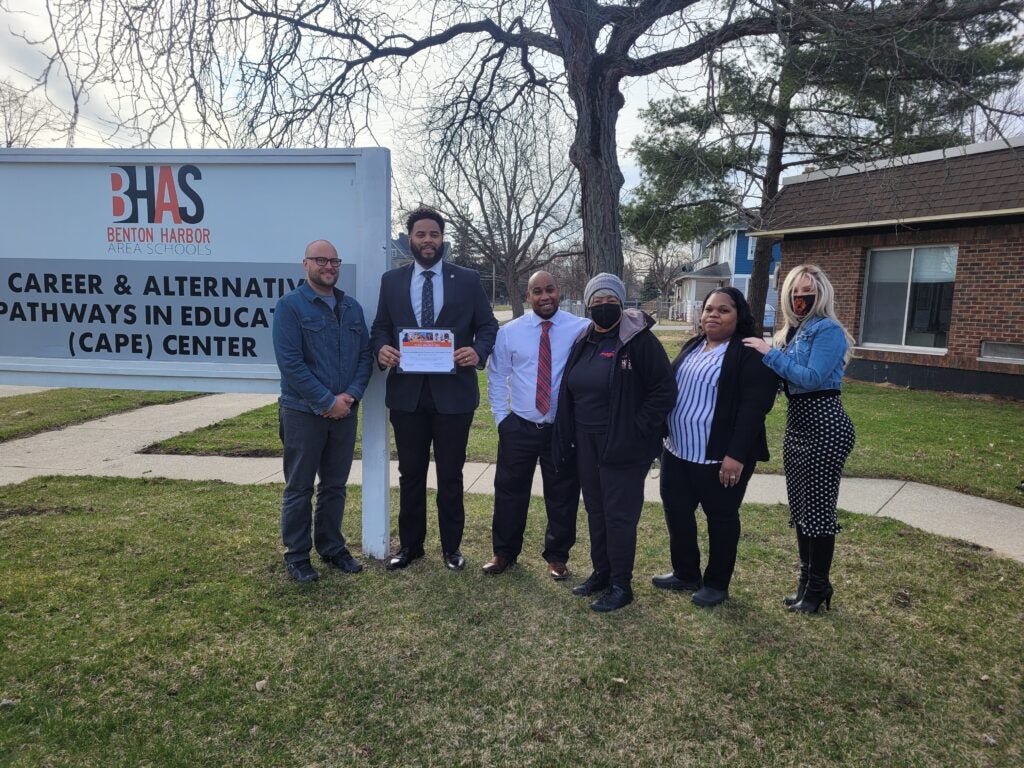Trust and Respect: How Benton Harbor is Transforming School Breakfast
No Kid Hungry Michigan is excited to present the first entry in a new blog series highlighting the 2022 No Kid Hungry Michigan School Breakfast Heroes. Join us to learn more about how these Heroes throughout Michigan’s school kitchens and cafeterias increase breakfast participation within their schools and districts, and see what steps you can take to increase breakfast participation in your school. For the complete list of 2022 No Kid Hungry Michigan School Breakfast Heroes, please visit our page here.
As general manager of Benton Harbor Area School District’s Food Service, (managed by SodexoMAGIC), Ricardo Carter takes pride in his job. He started this role during the beginning of the pandemic in 2020. His predecessor had set up the foundation of a solid breakfast program for the district, and Carter knew he had a good building block to take the program to the next level.
And so he did – comparing breakfast data from October 2019 to October 2021, a shining example of Carter’s hard work can be seen at the Career and Alternative Pathways to Education Center. This particular school had an increase in Average Daily Participation (ADP%) for Breakfast from 16% to an amazing 92% of all enrolled students. In other words, by the end of 2021, the school was serving breakfast to 88 out of 92 total students every single day.
“Breakfast is always a point of growth,” explained Carter in conversation with Mindy Grant, senior program manager for No Kid Hungry Michigan, “and breakfast participation had been down. We wanted to see what we could do.”
With lots of praise for building staff, especially Administration Supervisor Alecia Lee, Carter then gave a detailed rundown of what he and his staff worked on as they aimed to improve breakfast numbers. First, he aimed to improve logistics, such as improving kitchen and meal transportation equipment. Carter noted that he made use of the district’s excess fund balance in order to make these improvements. While meals are produced at a centralized production facility for the elementary schools, Carter noted that he and his team decided to serve meals from a high school production kitchen, keeping them hot in warmers, which allowed them to provide more “adult” style meals for students. All of these small details greatly improved student satisfaction.

(L-R) CAPE School Director Josh Perkins, Superintendent Dr. Andrae Townsel, general manager Ricardo Carter, school food service worker Irma Walker, food service assistant manager Alecia Lee, and CAPE Associate Director Heather Mueller stand for a photo.
With these new logistical plans in place, Carter then acknowledged the main factor which contributed to the large increase in breakfast participation was the power of trust.
“We find products that the kids like and that also stay in compliance [with SBP / NSLP guidelines],” shared Carter, “and in a community like this, establishing trust is everything…We can deliver on these good meals and we are going to feed them things that they actually like.”
He went on to explain the various ways that he’s worked in order to gather student feedback, from making himself more physically present at schools, to getting on a truck and delivering meals himself during the height of the pandemic, and even assisting in the creation of a student advisory council.
“Who better than the kids who are actually eating the food to get feedback from?” posed Carter, continuing, “our community will tell you exactly how they feel if they don’t like something. When you are doing it right, they will tell you that too.”
He shared that the student advisory council acted as a platform for students to get their voices heard – a lesson that Carter hopes students can carry throughout their lives – through previews of new menu items and samples, while offering direct feedback for the food service team. Ultimately, the student advisory board increased student interest and anticipation for new breakfast menu items.
Carter concluded by expressing his comfort with the students and the importance of his role as general manager, stating, “Before this year, kids did not know who I was, and now it’s always, ‘Hey Mr. Carter!’” from both students and faculty alike. He echoed that having a conversation with school administration officials and students, as well as establishing trust with the products the food service team is putting on the plate, is key to success. He proudly added, “One of the best feelings is when you can really have an impact with the kids – and this is why we do what we do.”
In the interview, Carter also flagged that the USDA non-congregate waiver allowed him to serve virtual students and was key in increasing student participation. Last month, Congress did not include a provision to extend the USDA’s authority to issue nationwide child nutrition waivers. Without this Congressional authority, the USDA’s ability to offer flexibility is limited. For more on this, and to read No Kid Hungry Senior Vice President Lisa Davis’s full statement, click here.

